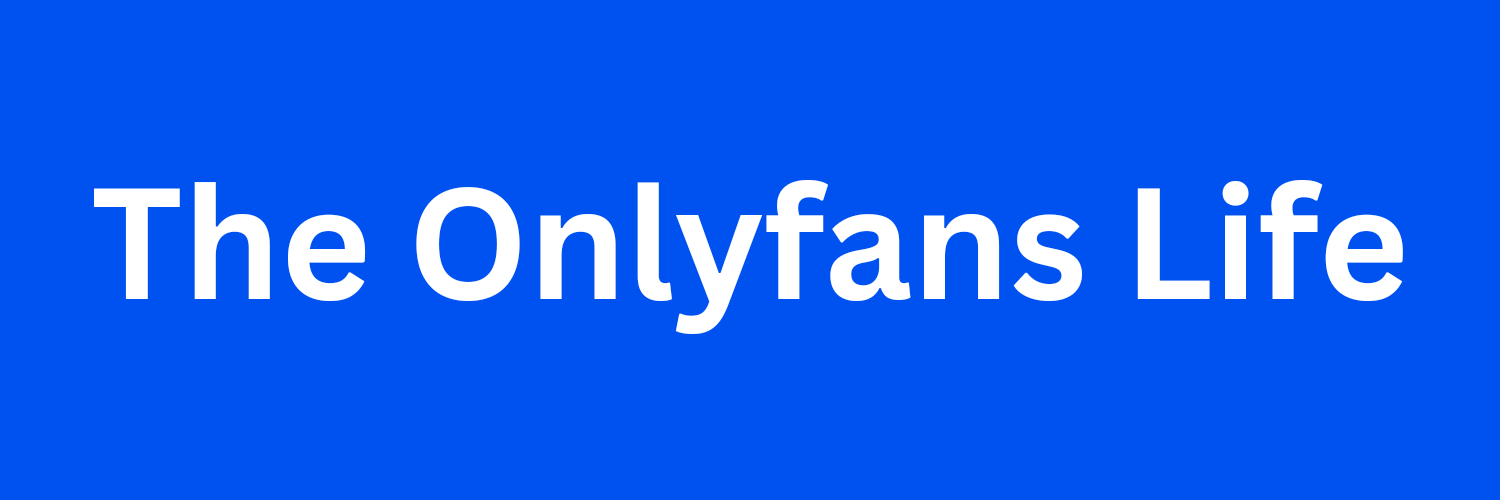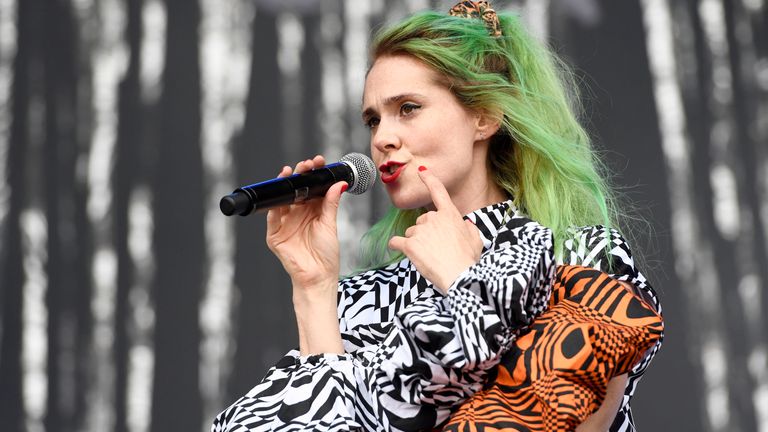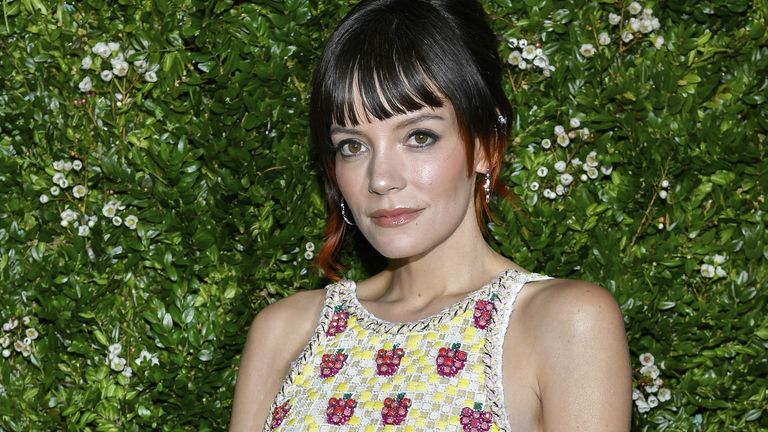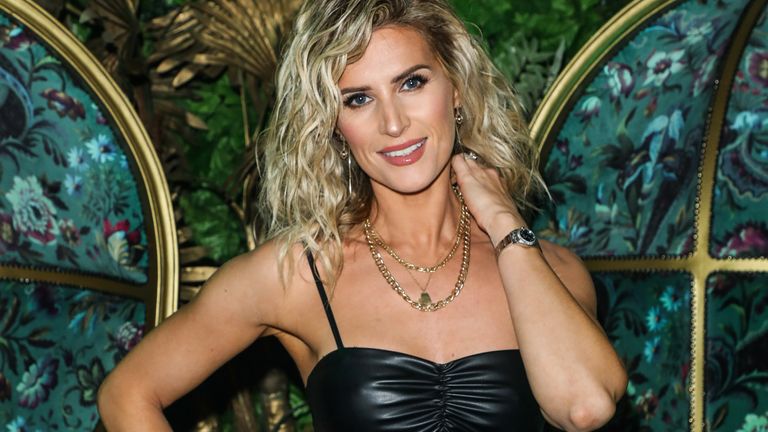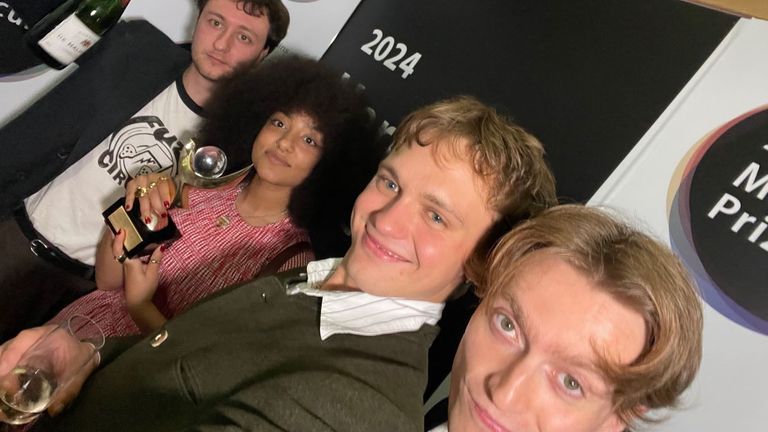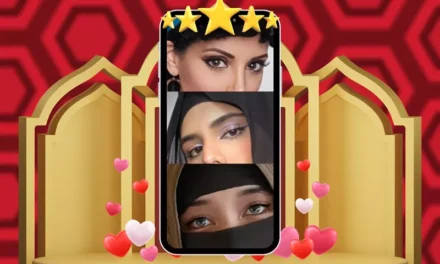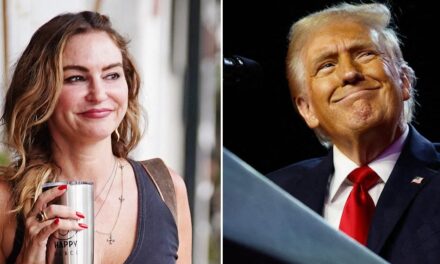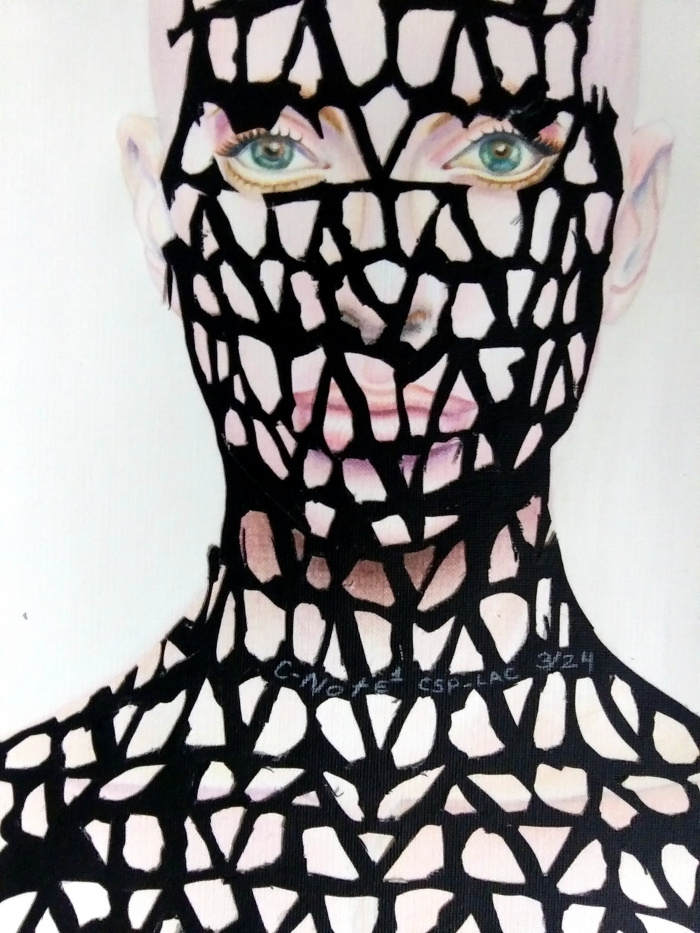Kate Nash has a message for critics: “Not all heroes wear capes. Some just sell pictures of their bum.”
The singer’s bum jokes pepper the conversation, but her arse – as she says – highlights a very serious point. “The music industry is failing. It’s failing its artists, and soon it’s going to be failing fans, too.”
If you’re not sure why Kate Nash’s bottom is now an emblem for saving the music industry, a recap: last week, the singer announced she had joined OnlyFans, the online adult content subscription service popular with, but not exclusively for, sex workers.
#ButtsForTourBuses, Nash said, will subsidise her live shows, which are becoming prohibitively expensive for many artists.
Fans are supportive, she tells Sky News, but her (mostly covered) bottom has faced criticism: “I’ve been called apocalyptic and a prostitute, which is outdated – it’s sex worker – but I’ll take ‘apocalyptic prostitute’ because it’s quite an epic title. To me, the idea of a country with no grassroots, no working-class people in music, no [smaller] venues, only stadiums – that’s apocalyptic.”
Last year, a Musicians’ Union and Help Musicians census found musicians’ average income was £20,700, compared to a population average of £37,430 for full-time workers. But almost half the musicians who responded were taking home less than £14,000, and more than half relying on other sources of income.
Industry insiders say even established names are having to take on second jobs.
Nash, 37, is an established artist who rose to fame with her 2007 debut album Made Of Bricks, and its hit single Foundations. She starred in the Netflix female wrestling comedy-drama Glow, released her fifth album, 9 Sad Symphonies, earlier this year, and has almost a million monthly listeners on Spotify.
When we speak, she is in the middle of a run of UK gigs at venues up to 1,500 capacity. She considered cancelling after tours in the US and Europe left her struggling financially. Costs have gone up by almost a third in recent years, she says.
“It’s a financial strain and everybody at my level and under is feeling that. You just lose so much money touring.”
To make up for the shortfall, Nash has sent her posterior viral. Her first photo on 20 November gained hundreds of likes. The pictures show her in her knickers, nothing explicit. “This is what a feminist looks like,” is her t-shirt slogan in one image.
A subscription is $9.99 (about £7.95) a month. The singer doesn’t want to reveal yet how much she has earned but says it has already made up for any losses she incurred on tour.
“I’ll just say you can make a surprising amount… right now it’s just for me to see what happens – and see how far my arse can take me.”
The musician is not the first to turn to OnlyFans. Rappers Iggy Azalea and Cardi B reportedly made millions before coming off the site, and earlier this year, Lily Allen claimed her account selling pictures of her feet was earning more than her seven million-plus monthly Spotify listeners.
OnlyFans says it empowers content creators, particularly women, to monetise images and videos online in a safe environment. In 2021, actress Sarah Jayne Dunn, who was starring in Hollyoaks at the time, joined the site to do just this – but was then dropped from the soap as the content didn’t align with its younger demographic.
And there has been criticism over the potential for exploitation – a recent Reuters investigation talked to women who claimed they had been forced to make money for others.
But like Nash, Allen said she found the experience empowering, “because having been very sexualised from a very early age and literally everybody else in the process profiting from that sexualisation, it’s actually really fun to be in power and in control of something that I find so silly”.
Nash says she wanted to be honest about the difficulties of touring. Just a few weeks ago, BBC Sound Of nominee and NME award winner Rat Boy announced he was cancelling his band’s UK tour, saying they couldn’t make it affordable, “even with us driving, teching and all four of us sharing a single bed on top of the van”.
Singer-songwriter Rachel Chinouriri, who is supporting Sabrina Carpenter’s UK and European tour dates next year, also cancelled a series of US dates due to costs. In the summer, Mercury Prize nominee Nadine Shah said she turned down a slot at Glastonbury as it was “too expensive a hit”.
Brexit, the pandemic and now the cost of living crisis have impacted everyone, but experts say the music industry has been hit particularly hard.
Sarah Pearson, who has worked in the industry for 25 years, runs management and PR agency Wasted Youth Music and is co-founder of the Beyond The Music co-operative. She says many artists have recently had no choice but to take on other work.
“Fans and consumers and people outside of the industry might think it’s a glamorous life… but it’s just not true [for most] anymore,” she says.
“We’re at an impasse right now where artists can’t make money from their art, which is serious for our cultural future. Where is the money going to come from and how can we create sustainable careers?”
In March, singer Lily Fontaine, from this year’s Mercury Prize winners English Teacher, spoke in parliament about the “ongoing crisis”, alongside David Martin, chief executive of the Featured Artists Coalition trade body.
“Audiences are finding their purses are very tight and they can’t afford ticket price increases, they’re scaling back,” says Martin. “On the supply side, costs are going up. Artists are the biggest employers in the music industry. On the live side, artists pay for practically everything – accommodation, transport, rehearsals, session musicians… managers, crew, technicians, agents.”
According to the Music Venues Trust, 125 venues were forced to close or stop hosting live music in 2023 due to costs. So far this year, more than 70 festivals have closed.
But a recent report found that UK music’s contribution to the economy in 2023 hit a record £7.6bn, with exports also hitting a new high of £4.6bn – so there is money to be made.
“There are real issues about how artists have been locked into contracts that were perhaps signed before the digital era,” says Martin. “There is money in the system. It just needs to be distributed equitably.”
Read more:
Inside the UK’s music festival crisis
‘There is no HR department in the music industry‘
Earlier this month, the government announced plans to push through a voluntary levy on tickets for concerts at stadiums and arenas to help fund grassroots venues.
It’s a “massive step”, says Beyond The Music’s Pearson, but help is also needed for other areas of the industry such as recorded music, too: “There needs to be a massive cross-industry investment fund… something like the Football Foundation where the Premier League clubs invest in the grassroots to develop and nurture talent for the future of the sport.”
Some household names have kicked things off themselves, with Coldplay pledging to donate 10% of profits to help smaller venues, and Katy Perry giving £1 for every ticket sold, from their arena and stadium shows in 2025.
As for Nash, she says she did not “need” to join OnlyFans, but chose to so that she can run her operation ethically. “I pay good wages, I don’t travel dangerously… I want to put on high-quality shows. I won’t sacrifice those things.”
There is “no shame”, she says, in how difficult it is for performers to earn a living now. “And I’m in a unique situation because I had a number one record 20 years ago that still helps me reinvest into myself. But it’s still not enough. What about people that don’t have that?”
The singer says ultimately, she would rather make money through sharing her bottom pictures than through relinquishing control.
“Some people think [OnlyFans] is a compromise – that’s how I would feel in a more corporate setting,” she says.
“My bum is for sale – my artistic vision is not.”
This post was originally published on this site be sure to check out more of their content.
